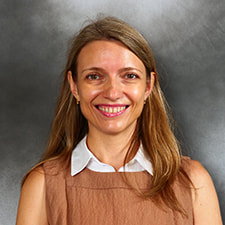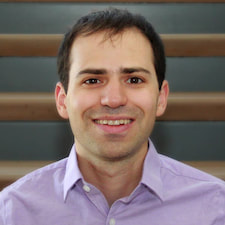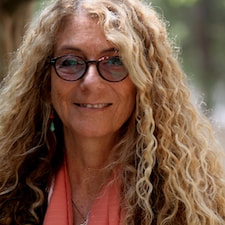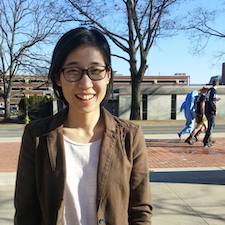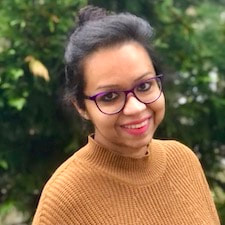|
Lena Mamykina, PhD, is an Associate Professor at the Department of Biomedical Informatics at Columbia University. Her research focuses on ways individuals engage with AI-powered systems in the context of health and medicine. Her recent projects included incorporating personalized predictions for meal-time changes in blood glucoses levels (GlucOracle) and a conversational agent for personalized coaching in diabetes (T2 Coach). Her work is funded by the National Science Foundation and the National Institute of Health and spans from innovative system design to clinical trials of technological interventions for self-management of chronic diseases. She holds degrees in Computer Science (BS), Human-Centered Computing (PhD) and Biomedical Informatics (BA).
|
|
Daniel Epstein, PhD, is an Assistant Professor in Informatics at the University of California, Irvine, where he directs the Personal Informatics Everyday lab. His work examines how the design of personal tracking technology can acknowledge and account for the realities of use in everyday life. He has organized multiple successful workshops on personal informatics and related topics at CHI, CSCW, and Ubicomp, and has received multiple paper awards and honorable mentions for his work at CHI. His research has been featured in the Wall Street Journal, The Atlantic, and Consumer Reports. He holds a Ph.D. in Computer Science & Engineering from the University of Washington.
|
|
Pedja Klasnja, PhD, is an Associate Professor in the School of Information at the University of Michigan. His research focuses on the development and evaluation of technologies for health behavior change and maintenance. In recent years, he has been mostly focusing on just-in-time adaptive interventions, digital interventions that use AI algorithms to personalize intervention provision to maximize intended health outcomes and minimize user burden. In addition to developing novel interventions, he also develops methods for optimization of digital interventions and for more efficient accumulation of evidence about such systems. Dr. Klasnja’s work is funded by the National Institutes of Health, with recent awards to develop and evaluate interventions for secondary prevention of cardiovascular disease, weight management, and primary prevention of cancer. He is also a lead of the methods core on a recently funded center for optimization of strategies used in initiatives to implement evidence-based clinical practice.
|
|
Donna Spruijt-Metz, MFA, PhD is a Research Professor in both Psychology and Population and Public Health Sciences at the University of Southern California. She has focused for most of her career on mobile technologies to understand health-related behaviors as well as to prevent and treat obesity and diabetes in ethnically diverse youth and families. She is currently Multiple PI on the U01 (NCI) Operationalizing Behavioral Theory for mHealth: Dynamics, Context, and Personalization, on the R01 (NIDDK) Function and Emotion in Everyday Life with Type 1 Diabetes: FEEL-T1D, and on the R01 (NIDA) Cultural Stress, Stress Response, and Substance Use among Hispanic Adolescents. She is also leader of the Investigator Development Core of a newly funded center to reduce health disparities in Southern California (P50, NIMHD). She founded and co-directs the USC mHealth Collaboratory with Dr. William Swartout, a leader in Artificial Intelligence.
|
|
Jochen Meyer, PhD, is director of the Health department at OFFIS - Institute for Information Technology in Oldenburg, Germany, where he is responsible for about 30 researchers working in regional, national and international projects. His research areas include technologies for wellbeing and prevention, ambient assisted living, and personal use of multimedia data, with a particular interest on long-term tracking in daily life. He is an active member of the research community, has amongst others conducted numerous workshops at CHI and other venues, was General Chair of IEEE ICHI 2020, and was AC of CHI 2019, 2020 and 2022.He holds a diploma and a PhD in Informatics from the University of Oldenburg.
|
|
Mary Czerwinski, PhD is a Partner Researcher and Research Manager at Microsoft Research. Mary’s research focuses primarily on information worker task management, health and wellness. Her background is in visual attention and multitasking. She holds a PhD in Cognitive Psychology from Indiana University in Bloomington. Mary was awarded the ACM SIGCHI Lifetime Service Award, was inducted into the CHI Academy, and became a Fellow of the ACM in 2016. She also received the Distinguished Alumni award from Indiana University’s Brain and Psychological Sciences department in 2014 and from the College of Arts and Sciences from Indiana U. in February, 2018. Mary became a Fellow of the American Psychological Science association in 2018 and was recognized as an EAI (European Alliance for Innovation) Fellow in 2019.
|
|
Tim Althoff, PhD, is an Assistant Professor in the Paul G. Allen School of Computer Science & Engineering at the University of Washington. His research advances computational methods that leverage large-scale behavioral data to extract actionable insights about our lives, health and happiness through combining techniques from data science, social network analysis, and natural language processing. Tim holds Ph.D. and M.S. degrees from Stanford University and M.S. and B.S. degrees from the University of Kaiserslautern, Germany. He has received several fellowships and awards including the SAP Stanford Graduate Fellowship, Fulbright scholarship, German Academic Exchange Service scholarship, the German National Merit Foundation scholarship, a Best Paper Award by the International Medical Informatics Association, the WWW 2021 Best Paper Award, two ICWSM 2021 Best Paper Awards, and the SIGKDD Dissertation Award 2019. Tim's research has been covered internationally by news outlets including BBC, CNN, The Economist, The Wall Street Journal, and The New York Times.
|
|
Eun Kyoung Choe, PhD, is an Associate Professor in the College of Information Studies at the University of Maryland, College Park. Her research bridges the fields of Human-Computer Interaction (HCI), Health Informatics, and Ubiquitous Computing. With an overarching goal of empowering individuals, her research centers on examining major challenges people face in leveraging personal data, such as personal data collection and exploration. Her work has been funded by the National Science Foundation, National Institutes of Health, and Microsoft Research. She has been serving on the editorial boards of PACM IMWUT and Foundations and Trends in Human-Computer Interaction. She received her PhD in Information Science from University of Washington.
|
|
Munmun De Choudhury, PhD, is an Associate Professor of Interactive Computing at Georgia Tech. Dr. De Choudhury is best known for laying the foundation of a line of research that develops computational techniques to responsibly and ethically employ social media in understanding and improving our mental health. Dr. De Choudhury has been recognized with the 2021 ACM-W Rising Star Award, 2019 Complex Systems Society – Junior Scientific Award, numerous best paper and honorable mention awards from the ACM and AAAI, and features and coverage in popular press like the New York Times, the NPR, and the BBC.
|
|
Brian Lim, PhD, is an Assistant Professor in the Department of Computer Science at the National University of Singapore (NUS). He leads the NUS Ubicomp Lab focusing on research on ubiquitous computing and explainable artificial intelligence for healthcare, wellness and smart cities. His research explores how to improve the usability of explainable AI by modeling human factors, and applying AI to improve clinical decision making and user engagement towards healthier lifestyles. He has been serving on the editorial board of PACM IMWUT and program committees for CHI and AAAI. He received a B.S. in engineering physics from Cornell University and a Ph.D. in human-computer interaction from Carnegie Mellon University.
|
